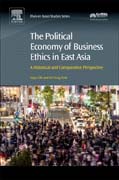
The Political Economy of Business Ethics in East Asia: A Historical and Comparative Perspective
Oh, Ingyu
Park, Gil Sung
The Political Economy of Business Ethics in East Asia deals with modes of ethical persuasion in both public and private sectors of the national economy in East Asia from the periods of the fourteenth century to the modern era. Authors in this volume ask how and why governments in pre-modern Joseon Korea, modern Korea, and modern Japan used moral persuasion of different kinds in designing national economic institutions. Case studies demonstrate that the concept of modes of exchange first developed by John Lie (1992) provides a more convincing explanation on the evolution of pre-modern and modern economic institutions compared with Marx's modes of production as historically-specific social relations, or Smith's free market as a terminal stage of human economic development. The pre-modern and modern cases presented in this volume reveal that different modes of exchange have coexisted throughout human history, contrary to deterministic and Eurocentric views of economic history. Furthermore, business ethics or corporate social responsibility is not a purely European economic ideology, because manorial, market, entrepreneurial, and mercantilist moral persuasions had widely been used by state rulers and policymakers in East Asia for their programs of advancing dissimilar modes of exchange. In a similar vein, the domination of the market and entrepreneurial modes in the twenty-first century world is also complemented by other competing modes of e-change, such as state welfarism, public sector economies, and protectionism. Compares Chinese, Japanese, and Korean business ethics from a comparative and historical contextExplores recent theoretical approaches to capitalist development in modern history in non-Western regionsDiscusses the theoretical usefulness of new institutionalism, modes of exchange, and neoclassical discussions of business ethics Evaluates historical texts in their own languages in its attempt to compare Chinese, Japanese, and Korean business ethics in the pre-modern and modern times INDICE: Chapter 1: Comparing State Economic Ideologies and Business Ethics in East Asia Chapter 2: The Concept of Mode of Exchange: An Auto-Critique Chapter 3: Why is Confucian worth ethic more competitive than Anglo-American business ethics? Chapter 4: Business Ethics in China Chapter 5:Financial Crisis and Minority Shareholders' Movement in Korea: The Unfolding and Social Consequences of the Movement Chapter 6: Mapping K-Pop Past and Present: Shifting the Modes of Exchange Chapter 7: Business Ethics During Mixed Modes of Exchange: South Korean Chaebol's Succession Challenge Chapter 8: Business Ethics and Government Intervention in the Market in Joseon Chapter 9: The Politics of Institutional Restructuring and its Moral Persuasion in Japan: The Case of the Iron and Steel Industry (1919-1934) Chapter 10: Conclusion
- ISBN: 978-0-08-100690-0
- Editorial: Chandos Publishing
- Encuadernacion: Cartoné
- Páginas: 300
- Fecha Publicación: 01/10/2016
- Nº Volúmenes: 1
- Idioma: Inglés
- Inicio /
- /
